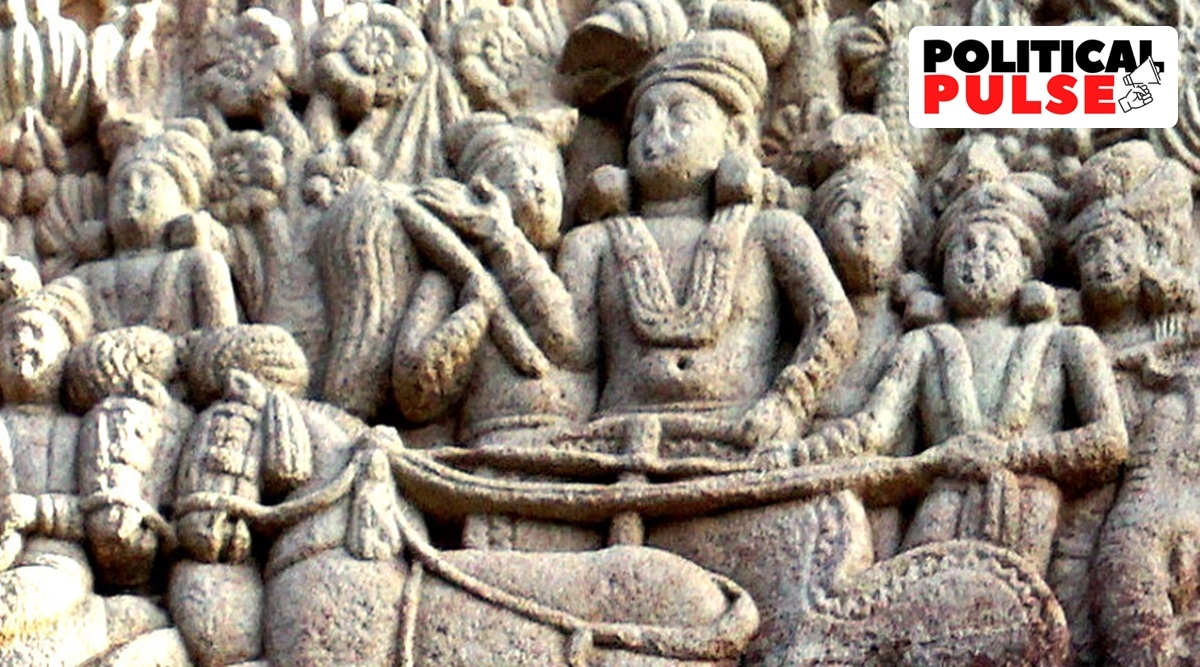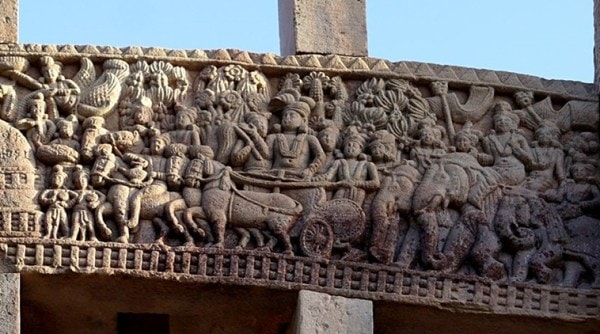 The BJP, which has an eye for icons covered in the cobwebs of history, was one of the first to recognise the political value of the Great Ashoka. (Wikimedia Commons)
The BJP, which has an eye for icons covered in the cobwebs of history, was one of the first to recognise the political value of the Great Ashoka. (Wikimedia Commons) By the BJP’s own calculation, this year will see the 2,327h birth anniversary of Emperor Ashoka. As good a time as any, it appears, to find out his “caste”.
With defections setting the caste cauldron of Uttar Pradesh again on a boil ahead of the Assembly polls, the heat is being felt by the Mauryan king who is believed to have ruled most of what is now called India between 268 BCE and 232 BCE. On two sides of the battlefield are rallied parties in neighbouring Bihar, the state which claims the king as its own.
The BJP, which has an eye for icons covered in the cobwebs of history, was one of the first to recognise the political value of the Great Ashoka. In 2015, the Bihar BJP marked his 2320th birth anniversary, even as the party’s government at the Centre issued a postal stamp on him.
Soon after, there were others claiming him as their own, particularly the OBC Kushwaha community, as well as backward class leaders across parties — the BJP, JD(U) and RJD. A senior Bihar leader from a party with a socialist background who does not want to be named says Ashoka, the descendant of the dynasty founded by his grandfather Chandragupta Maurya, was “a grand OBC face and voice of the subaltern”.
 Emperor Ashoka’s visit to the Ramagrama stupa. (Wikimedia Commons)
Emperor Ashoka’s visit to the Ramagrama stupa. (Wikimedia Commons) Bihar Chief Minister Nitish Kumar has refrained from attaching caste to such icons, but he has named a number of buildings and institutions after them, including the Chandragupta Management Centre and Samrat Ashok Convention Hall at Patna. Panchayati Raj Minister Samrat Choudhary, who belongs to the BJP, points to the number of buildings at panchayat levels named after Ashoka.
The latest tussle to appropriate Ashoka was kicked off when Sahitya Akademi Award winner, former IAS officer and a BJP worker, Daya Prakash Sinha, said in an interview to Navbharat Times: “While doing research on Samrat Ashok, I was greatly surprised at several similarities between him and Mughal Emperor Aurangzeb. Both had committed many sins in their early days and later resorted to over-religiosity to hide their sins so that people were digressed towards religion and their sins are overlooked.” Sinha had got the Sahitya Akademi Award for his play Samrat Ashoka.
He also commented on Ashoka’s looks, saying that several Buddhist works called him “very ugly”.
Three Kushwaha leaders, from three different parties — Bihar Panchayati Raj Minister and BJP MLC Samrat Choudhary, JD(U) leader Upendra Kushwaha and RJD national spokesperson Subodh Mehta – were the first to jump to the Emperor’s defence. The present-day “Mauryas” are Kushwahas.
Soon, all top Bihar leaders were rallied behind him — from the BJP’s Sushil Kumar Modi (former deputy CM and Rajya Sabha MP) to Sanjay Jaiswal (BJP state president) and former CM Jitan Ram Manjhi.
The BJP went on to file an FIR against Sinha “for hurting people’s sentiments”, while Manjhi, the BJP’s prickly ally JD(U) and the RJD demanded that his awards be taken back.
 Pillar erected by Maurya Dynasty Emperor Ashoka. (Wikimedia Commons)
Pillar erected by Maurya Dynasty Emperor Ashoka. (Wikimedia Commons) Then, the BJP insisted Sinha had noting to do with the party. Jaiswal said: “We are surprised that Sinha describes himself as national convenor of the BJP’s cultural cell. In fact, he is not even a primary member of our party.” In a social media blog, the BJP state chief said Ashoka had played “a big role as a unifer” and given a message of peace to the world after the Kalinga War.
Historians record Ashoka as having been ruthless in his early reign until he launched a campaign against the Kingdom of Kalinga. Such was the carnage in that battle that it motivated him to renounce war and, over a time, adopt Buddhism and the concept of dhamma. He then played a large part in the spread of Buddhism in the region.
In the present that is on everyone’s minds, the Kushwahas, at 8% per cent of Bihar’s population, are an essential part of the JD(U)’s OBC base. The BJP and RJD too have a good number of Kushwaha leaders.
However, there is a more immediate reason, as a JD(U) leader points out. “With the BJP losing some OBC leaders to the Samajwadi Party (particularly one of the biggest, Swami Prasad Maurya) in Uttar Pradesh, it doesn’t want to be party to any issue that might affront the Dalits or OBCs further.”
- The Indian Express website has been rated GREEN for its credibility and trustworthiness by Newsguard, a global service that rates news sources for their journalistic standards.

